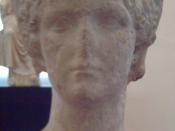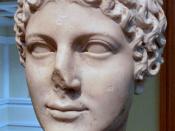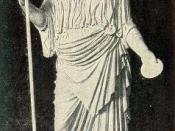Sources from ancient historians tend to be more hostile towards Agrippina because she was a woman and she stepped outside the expected role of a Roman matron. In contrast to this, modern historians consider the context of her time and approach her with a neutral attitude. However, most of the historians present her according to three main stereotypes- the seducer and murderer of Claudius, the scheming and dominating mother figure or the imperial woman who goes beyond her matronly and aristocratic role.
Tacitus, an ancient historian, was the closest to Agrippina's time and was hostile towards her since he disliked the principate, instead favouring the senate to be in power. He portrayed Agrippina as a deceptive, ill- mannered woman and is highly- critical of her behaviour. Tacitus claimed that the death of Junius Silanus was "treacherously contrived" by Agrippina and that she "deterred" a young noble man from marrying Junia Silana because she wanted to keep him from obtaining the childless Silana's wealth.
Both of the above cases highlight Agrippina's deception and manipulative skills. Tacitus presents his condescending view of women when he wrote, " A youth under feminine control was not reassuring". Not only this, he believes that Agrippina's "angry and menacing" behaviour upsetted Nero and led him to poison his stepbrother, Britannicus. In addition to this, Tacitus wrote that Agrippina's "intolerable" manner led to Nero's decision to kill her. He believed that a plot to kill her would not work because her "criminal conscience" would keep her alert. This shows that not only does he blame Agrippina for her death but he also labeled her as being a criminal.
However, Dio Cassius is not as bitter towards Agrippina as Tacitus and his comments on her are less subjective. This can be seen in the case of...


